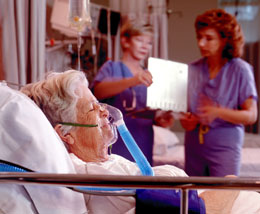It is important to know that there is hope for those diagnosed with stage 4 bone cancer and they have treatment options too. Cancer patients need emotional support along with proper medical treatment. Read on, to know the prognosis and treatment options for fourth stage bone cancer.

Being a cancer patient, I know how shocking it would be to get diagnosed with any type of stage 4 cancer. Cancer, the word itself is a cause of deep concern and bone cancer is no different. Thanks to the researchers and medical advancements, there exist treatments for stage 4 cancer. So, don't lose hope if you find yourself in such a situation.
Bone Cancer
Every year, around 2000 people are diagnosed with bone cancer in the U.S. Occurrence of malignant tumors in bone tissue itself, is called primary bone cancer. Malignant tumors from other organs may spread (metastasize) to the bones in the body during the fourth stage. This type of situation is referred to as secondary or metastasized bone cancer.
The type of bone cancer like chordoma, fibrosarcoma, Ewing's sarcoma, osteosarcoma, etc. is determined depending upon the exact location of the bone tumor (the part of the bone where the tumor exists).
Symptoms
During the fourth stage of bone cancer, quite large tumors, generally more than five centimeters in size can be noticed. In fact, during this stage, tumors of any size can be noticed. As the cancer has already spread to other organs (secondary cancer), lymph nodes are already affected by cancerous cells. Painful bones and joints, swelling of bones and joints, problems with movement, increased susceptibility to fractures, unexplained weight loss, excessive tiredness, extreme fatigue, fever and sweating, dysfunction of other organs are the general symptoms of advanced bone cancer.
Prognosis
Thanks to the advanced technology, the chances of recovery (prognosis) from bone cancer have significantly improved. Discovery of new chemotherapy medications and various other drugs have contributed towards increased bone cancer life expectancy.
The chance of recovery from the cancer depends upon the following factors: overall health, age and mental stability of the patient, how much the cancer has spread, how long the patient has had the symptoms, the type of bone cancer, how much cancer can be taken out by surgery, how much can be killed by chemotherapy and radiation therapy, the size of the tumor at the time of diagnosis, location of the tumor, the stage at which the cancer was diagnosed and certain other individual factors.
Survival Rate
It is actually difficult to predict bone cancer survival rate in general. When the tumor is very small and localized, about 90% patients survive at least for five-years. The five-year survival rate comes down to about 60%, and bone cancer prognosis becomes poor, once the cancer spreads to distant organs. Since certain genetic factors influence the survival rate, the rate may vary according to race and sex. Stage 4 bone cancer survival rate is about 32%. About 15% cases are diagnosed at fourth or advanced stage. The exact staging information is not available for about 8% of the total bone cancer cases diagnosed, and the five-year survival rate for these cases is around 63%.
Treatment
The rate of growth of cancerous cells can vary from person to person. The treatment for fourth stage bone cancer may include radiation therapy and chemotherapy. But along with anti-cancer drugs, other medications like pain killers, can help tackle other health problems and alleviate severe pain.
This Buzzle article is for informative purposes only, and should not be used as a replacement for expert medical advice. Considering the physical and the mental stress that a patient of stage 4 bone cancer has to face, family members should try to keep the patient engaged in activities that would take his/her mind off the disease. Family members should encourage and help the patient to overcome the negativity, depression, sadness and anger. Sharing the sorrow with the loved ones and joining a support group can definitely fill the patient with optimism. The success of cancer treatment lies in such minute things. Positive thinking makes a lot of difference.


 Being a cancer patient, I know how shocking it would be to get diagnosed with any type of stage 4 cancer. Cancer, the word itself is a cause of deep concern and bone cancer is no different. Thanks to the researchers and medical advancements, there exist treatments for stage 4 cancer. So, don't lose hope if you find yourself in such a situation.
Being a cancer patient, I know how shocking it would be to get diagnosed with any type of stage 4 cancer. Cancer, the word itself is a cause of deep concern and bone cancer is no different. Thanks to the researchers and medical advancements, there exist treatments for stage 4 cancer. So, don't lose hope if you find yourself in such a situation.